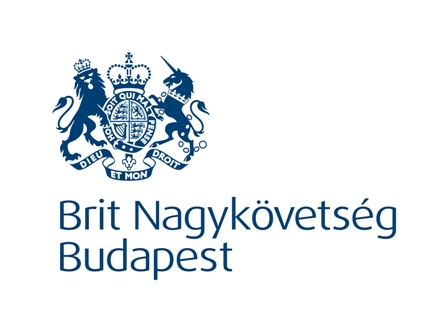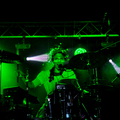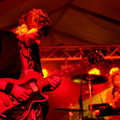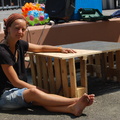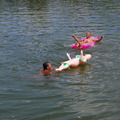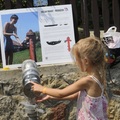The 3-days-long summer camp titled “The Dream State” was organized by the volunteers of Marom Budapest and the HCLU Roma Program in the frames of the Bánkitó Festival on the third weekend of July 2012. The camp had 25 participants – both Roma and non-Roma – between the age of 12 and 17 arriving from the poorest regions of Hungary. The whole planning and implementation process was done by young Roma and non-Roma volunteers: university students, civil activists, active citizens under the age of 25. The main goal of the summer camp was to disseminate basic citizenship skills and knowledge to the participating children while also providing them a great experience of taking part at a cultural festival, meeting open-minded and interesting young people and last but not least having a real vacation by a beautiful lake.
In the Summer Camp besides the many activities, we had time to fulfill the program of Democracy Workshop as well. As initially planned we needed to form two separate groups regarding the age-difference, in order to successfully accomplish the goals of our civic education. The goal of the workshop was to reach common findings and discretions through interactive group work, where the learned lesson remains not just a distant theoretical knowledge but becomes practical skill and embedded attitude.
The initial situation for both groups was to imagine a world after a natural catastrophe which destroys everything except their small village, but nothing is left which means they have to re-build their own community. Through questions and answers the moderator helped the kids to go through the process, starting from understanding the importance of the community (versus living alone), the difficulty of public decision making, the phenomenon of the state, democracy and dictatorship, political power and political system.
With the first group (under the age of 14) the second task was to illustrate the new world they have created in the first session, with many different tools, which they pretty much enjoyed. With the second group (above the age of 14) they established their own Parliament where they formed two fractions and had to discuss two issues. The first one was death penalty: one fraction had to argue against it, while the other group was pro-death penalty. The second issue was the dilemma of how to spend the community’s certain amount of money: to build a factory or to help the poorest families in the village. After the speeches of the keynoters there was room to discuss the issues, ask questions, modify the way of arguing and finally the mini-Parliament had to make a decision, naturally by voting.
Despite the natural restraint of capturing the whole idea of the state, we even managed to discuss the principle of sovereignty and representation and the system of checks and balances.
Another important and very well received program was the workshop of the Amnesty International Hungary. The workshop aimed to strengthen the children in being aware of the representation and the protection of their legal and human rights and also know their responsibilities. It provided an excellent opportunity for the kids to learn about human rights and to be able to look at certain issues from the human rights perspective. The workshop
also introduced concepts like hate-speech, death penalty, the right to life, the equality of rights etc. The leaders used interactive tools, situation games and opened discussions about the main themes.
Many other programs were squeezed into the very short time such as the arts and crafts workshop of “NoHa”, the music workshops in the evenings with the “Dorco Band” from Tomor, Borsod County and the interactive games of the “Mosolygó Kórház Foundation”.
The afternoons were filled with fun: playing and swimming at the beach or visiting different programs of the festival. On Saturday night the kids were invited to the concert of the Dorco Band in the festival where they created an amazing atmosphere by presenting their excellent dancing and singing skills.
All the camp counselors and workshop leaders reported that the children were very much eager to learn but were also having the time of their lives in Bánk. The feedbacks from the children were very good as well. Most of them have never been on a real holiday before where they could enjoy themselves in a warm and open environment surrounded by people caring for and being interested in getting to know them.
The project couldn’t have been implemented without the generous support of the British Embassy.
